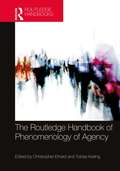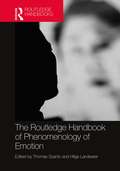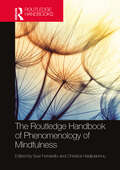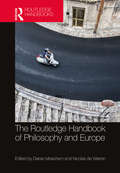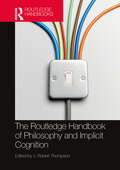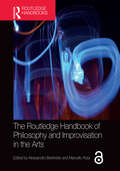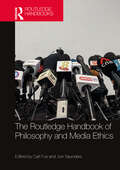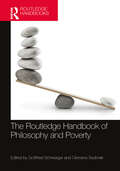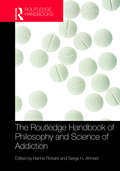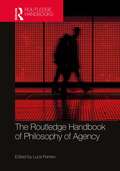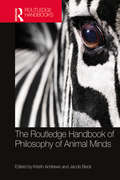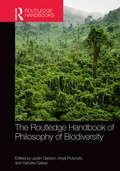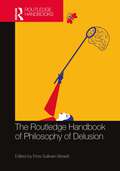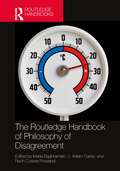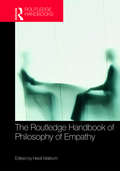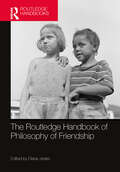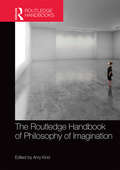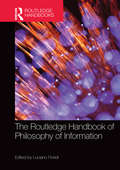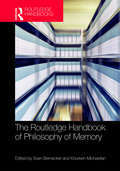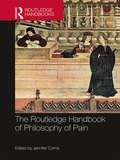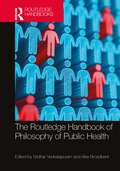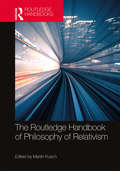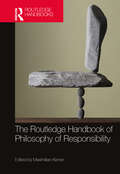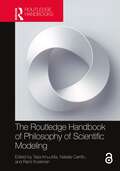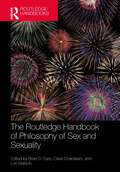- Table View
- List View
The Routledge Handbook of Phenomenology of Agency (Routledge Handbooks in Philosophy)
by Christopher Erhard Tobias KeilingPhenomenology has primarily been concerned with questions about knowledge and ontology. However, in recent years the rise of interest and research in phenomenology and embodiment, the emotions and cognitive science has seen the concept of agency move to a central place in the study of phenomenology generally. The Routledge Handbook of Phenomenology of Agency is an outstanding reference source to this topic and the first volume of its kind. It comprises twenty-seven chapters written by leading international contributors. Organised into two parts, the following key topics are covered: • major figures• the metaphysics of agency• rationality• voluntary and involuntary action• moral experience• deliberation and choice• phenomenology of agency and the cognitive sciences• phenomenology of freedom• embodied agency Essential reading for students and researchers in phenomenology, philosophy of mind, metaphysics and philosophy of cognitive science The Routledge Handbook of Phenomenology of Agency will also be of interest to those in closely related subjects such as sociology and psychology.
The Routledge Handbook of Phenomenology of Emotion (Routledge Handbooks in Philosophy)
by Thomas Szanto Hilge LandweerThe emotions occupy a fundamental place in philosophy, going back to Aristotle. However, the phenomenology of the emotions has until recently remained a relatively neglected topic. The Routledge Handbook of Phenomenology of Emotion is an outstanding guide and reference source to this important and fascinating topic. Comprising forty-nine chapters by a team of international contributors, this handbook covers the following topics: historical perspectives, including Brentano, Husserl, Sartre, Levinas and Arendt; contemporary debates, including existential feelings, situated affectivity, embodiment, art, morality and feminism; self-directed and individual emotions, including happiness, grief, self-esteem and shame; social emotions, including sympathy, aggresive emotions, collective emotions and political emotions; borderline cases of emotion, including solidarity, trust, pain, forgiveness and revenge. Essential reading for students and researchers in philosophy studying phenomenology, ethics, moral psychology and philosophy of psychology, The Routledge Handbook of Phenomenology of Emotion is also suitable for those in related disciplines such as religion, sociology and anthropology.
The Routledge Handbook of Phenomenology of Mindfulness (Routledge Handbooks in Philosophy)
by Susi Ferrarello Christos HadjioannouThe Routledge Handbook of Phenomenology of Mindfulness brings together two schools of thought and practice that – despite rarely being examined jointly – provide an incredibly fruitful way for exploring thinking, the mind, and the nature and practice of mindfulness. Applying the concepts and methods of phenomenology, an international team of contributors explore mindfulness from a variety of different viewpoints and traditions. The handbook’s 35 chapters are divided into seven clear parts: Mindfulness in the Western Traditions Mindfulness in the Eastern Traditions Mindfulness, Ethics, and Well-Being Mindfulness, Time, and Attention Mindfulness and Embodiment Applications: Mindfulness in Life Conclusion: Mindfulness and Phenomenology? Within these sections, a rich array of topics and themes are explored, ranging from Stoicism and the origins of mindfulness in Buddhism and eastern thought to meditation, self-awareness, the body and embodiment, and critiques of mindfulness. Additionally, the book delves into the ways the ideas of leading phenomenological thinkers, including Heidegger, Merleau-Ponty, and Levinas, can contribute to understanding the relationship between phenomenology and mindfulness. A valuable resource for those researching phenomenology and applications of phenomenology, this handbook will also be of great interest to students and practitioners of mindfulness in areas such as counseling and psychotherapy.
The Routledge Handbook of Philosophy and Europe (Routledge Handbooks in Philosophy)
by Darian Meacham; Nicolas de WarrenUnderstood historically, culturally, politically, geographically, or philosophically, the idea of Europe and notion of European identity conjure up as much controversy as consensus. The mapping of the relation between ideas of Europe and their philosophical articulation and contestation has never benefitted from clear boundaries, and if it is to retain its relevance to the challenges now facing the world, it must become an evolving conceptual landscape of critical reflection. The Routledge Handbook of Philosophy and Europe provides an outstanding reference work for the exploration of Europe in its manifold conceptions, narratives, institutions, and values. Comprising twenty-seven chapters by a group of international contributors, the Handbook is divided into three parts: Europe of the philosophers Concepts and controversies Debates and horizons. Essential reading for students and researchers in philosophy, politics, and European studies, the Handbook will also be of interest to those in related disciplines such as sociology, religion, and European history and history of ideas.
The Routledge Handbook of Philosophy and Implicit Cognition (Routledge Handbooks in Philosophy)
by J. Robert ThompsonHumans think of ourselves as acting according to reasons that we can typically articulate and acknowledge, though we may be reluctant to do so. Yet some of our actions do not fit this mold—they seem to arise from motives and thoughts that appear outside of our control and our self-awareness. Rather than treating such cases as outliers, theorists now treat significant parts of the mind as operating implicitly or ‘behind the scenes’. Mental faculties like reasoning, language, and memory seem to involve this sort of implicit cognition, and many of the structures we use to understand one another seem infused with biases, perceptions, and stereotypes that have implicit features. The Routledge Handbook of Philosophy and Implicit Cognition is an outstanding guide and reference source to this important topic. Composed of more than thirty chapters by an international team of contributors, the Handbook is divided into eight clear parts: Defining Features? Identifying Implicitness Among Cognate Notions The Nature and Limits of Implicit Processing Ways of Perceiving, Knowing, Believing Language Agency and Control Social Cognition Memory Learning and Reasoning. The Routledge Handbook of Philosophy and Implicit Cognition is essential reading for students and researchers in philosophy of psychology, moral psychology, and philosophy of mind, and will also be of interest to those in related disciplines such as psychology, neuroscience, and linguistics.
The Routledge Handbook of Philosophy and Improvisation in the Arts (Routledge Handbooks in Philosophy)
by Alessandro Bertinetto Marcello RutaOver the last few decades, the notion of improvisation has enriched and dynamized research on traditional philosophies of music, theatre, dance, poetry, and even visual art. This Handbook offers readers an authoritative collection of accessible articles on the philosophy of improvisation, synthesizing and explaining various subjects and issues from the growing wave of journal articles and monographs in the field. Its 48 chapters, written specifically for this volume by an international team of scholars, are accessible for students and researchers alike. The volume is organized into four main sections:I Art and Improvisation: Theoretical PerspectivesII Art and Improvisation: Aesthetical, Ethical, and Political PerspectivesIII Improvisation in Musical PracticesIV Improvisation in the Visual, Narrative, Dramatic, and Interactive Arts Key Features: Treats improvisation not only as a stylistic feature, but also as an aesthetic property of artworks and performances as well as a core element of artistic creativity. Spells out multiple aspects of the concept of improvisation, emphasizing its relevance in understanding the nature of art. Covers improvisation in a wide spectrum of artistic domains, including unexpected ones such as literature, visual arts, games, and cooking. Addresses key questions, such as:- How can improvisation be defined and what is its role in different art forms?- Can improvisation be perceived as such, and how can it be aesthetically evaluated?- What is the relationship between improvisation and notions such as action, composition, expressivity, and authenticity?- What is the ethical and political significance of improvisation?
The Routledge Handbook of Philosophy and Media Ethics (Routledge Handbooks in Applied Ethics)
by Joe Saunders Carl FoxThe media informs, entertains, and connects us. It is woven into the fabric of politics. Its increasing immediacy has become an inescapable feature of almost everybody’s life. We are, at the same time, subject to the media and participants in it. The ethical questions it raises have never been more urgent. Trust is in short supply, but we need to share information while dealing with problems like misinformation, disinformation, and echo chambers. And what responsibilities fall on the state, and on other actors such as artists, advertisers, and social media users, as we reckon with endemic problems like racism, sexism, and classism? The Routledge Handbook of Philosophy and Media Ethics is an outstanding survey and assessment of this vitally important field. Comprising thirty chapters written by an international team of contributors, the Handbook is divided into five parts: • Freedom of Speech, Privacy, and Censorship• The News Media• Broadening the Scope: Giving Other Aspects of the Media their Due• Justice, Power, and Representation• Vice and Virtue Online The Routledge Handbook of Philosophy and Media Ethics is essential reading for students and researchers in philosophy, media and communication studies, politics, and law, as well as practising media professionals and journalists.
The Routledge Handbook of Philosophy and Poverty (Routledge Handbooks in Applied Ethics)
by Gottfried Schweiger Clemens SedmakThe problem of poverty is global in scope and has devastating consequences for many essential aspects of life: health, education, political participation, autonomy, and psychological well-being. The Routledge Handbook of Philosophy and Poverty presents the current state of philosophical research on poverty in its breadth and depth. It features 39 chapters divided into five thematic sections: Concepts, theories, and philosophical aspects of poverty research Poverty in the history of Western philosophy and philosophical traditions Poverty in non-Western philosophical thought Key ethical concepts and poverty Social and political issues The handbook not only addresses questions concerning individual, collective, and institutional responsibility towards people in extreme poverty and the moral wrong of poverty, but it also tackles emerging applied issues that are connected to poverty such as gender, race, education, migration, and climate change. Additionally, it features perspectives on poverty from the history of Western philosophy, as well as non-Western views that explore issues unique to the Global South. Finally, the chapters in the first part provide an overview of the most important aspects of social science poverty research, which serves as an excellent resource for philosophers and philosophy students unfamiliar with how poverty is empirically researched in practice. The Routledge Handbook of Philosophy and Poverty is an essential resource for students and researchers in philosophy, political science, sociology, development studies, and public policy who are working on poverty.
The Routledge Handbook of Philosophy and Science of Addiction (Routledge Handbooks in Philosophy)
by Hanna Pickard Serge H AhmedThe problem of addiction is one of the major challenges and controversies confronting medicine and society. It also poses important and complex philosophical and scientific problems. What is addiction? Why does it occur? And how should we respond to it, as individuals and as a society? The Routledge Handbook of Philosophy and Science of Addiction is an outstanding reference source to the key topics, problems and debates in this exciting subject. It spans several disciplines and is the first collection of its kind. Organised into three clear parts, forty-five chapters by a team of international contributors examine key areas, including: the meaning of addiction to individuals conceptions of addiction varieties and taxonomies of addiction methods and models of addiction evolution and addiction history, sociology and anthropology population distribution and epidemiology developmental processes vulnerabilities and resilience psychological and neural mechanisms prevention, treatment and spontaneous recovery public health and the ethics of care social justice, law and policy. Essential reading for students and researchers in addiction research and in philosophy, particularly philosophy of mind and psychology and ethics, The Routledge Handbook of Philosophy and Science of Addiction will also be of great interest to those in related fields, such as medicine, mental health, social work, and social policy.
The Routledge Handbook of Philosophy of Agency (Routledge Handbooks in Philosophy)
by Luca FerreroOne of the most basic and important distinctions we draw is between those entities with the capacity of agency and those without. As humans we enjoy agency in its full-blooded form and therefore a proper understanding of the nature of agency is of great importance to appreciate who we are and what we should expect and demand of our existence. The Routledge Handbook of Philosophy of Agency is an outstanding reference source to the key issues, problems, and debates in this exciting subject and is the first collection of its kind. Comprising 42 chapters by an international team of contributors, the Handbook is divided into eight clear parts: The Metaphysics of Agency Kinds of Agency Agency and Ability Agency: Mind, Body, and World Agency and Knowledge Agency and Moral Psychology Agency and Time Agency, Reasoning, and Normativity. A broad range of topics are covered, including the relation of agency to causation, teleology, animal agency, intentionality, planning, skills, disability, practical knowledge, self-knowledge, the will, responsibility, autonomy, identification, emotions, personal identity, reasons, morality, the law, aesthetics, and games. The Routledge Handbook of Philosophy of Agency is essential reading for students and researchers within philosophy of action, philosophy of mind, metaphysics, philosophy of psychology, and ethics.
The Routledge Handbook of Philosophy of Animal Minds
by Kristin Andrews Jacob BeckWhile philosophers have been interested in animals since ancient times, in the last few decades the subject of animal minds has emerged as a major topic in philosophy. The Routledge Handbook of Philosophy of Animal Minds is an outstanding reference source to the key topics, problems, and debates in this exciting subject and is the first collection of its kind. Comprising nearly fifty chapters by a team of international contributors, the Handbook is divided into eight parts: Mental representation Reasoning and metacognition Consciousness Mindreading Communication Social cognition and culture Association, simplicity, and modeling Ethics. Within these sections, central issues, debates, and problems are examined, including: whether and how animals represent and reason about the world; how animal cognition differs from human cognition; whether animals are conscious; whether animals represent their own mental states or those of others; how animals communicate; the extent to which animals have cultures; how to choose among competing models and explanations of animal behavior; and whether animals are moral agents and/or moral patients. The Routledge Handbook of Philosophy of Animal Minds is essential reading for students and researchers in philosophy of mind, philosophy of psychology, ethics, and related disciplines such as ethology, biology, psychology, linguistics, and anthropology.
The Routledge Handbook of Philosophy of Biodiversity (Routledge Handbooks in Philosophy)
by Sahotra Sarkar Justin Garson Anya PlutynskiBiological diversity - or ‘biodiversity’ - is the degree of variation of life within an ecosystem. It is a relatively new topic of study but has grown enormously in recent years. Because of its interdisciplinary nature the very concept of biodiversity is the subject of debate amongst philosophers, biologists, geographers and environmentalists. The Routledge Handbook of Philosophy of Biodiversity is an outstanding reference source to the key topics and debates in this exciting subject. Comprising twenty-three chapters by a team of international contributors the Handbook is divided into six parts: Historical and sociological contexts, focusing on the emergence of the term and early attempts to measure biodiversity What is biodiversity? How should biodiversity be defined? How can biodiversity include entities at the edge of its boundaries, including microbial diversity and genetically engineered organisms? Why protect biodiversity? What can traditional environmental ethics contribute to biodiversity? Topics covered include anthropocentrism, intrinsic value, and ethical controversies surrounding the economics of biodiversity Measurement and methodology: including decision-theory and conservation, the use of indicators for biodiversity, and the changing use of genetics in biodiversity conservation Social contexts and global justice: including conservation and community conflicts and biodiversity and cultural values Biodiversity and other environmental values: How does biodiversity relate to other values like ecological restoration or ecological sustainability? Essential reading for students and researchers in philosophy, environmental science and environmental studies, and conservation management, it will also be extremely useful to those studying biodiversity in subjects such as biology and geography.
The Routledge Handbook of Philosophy of Delusion (Routledge Handbooks in Philosophy)
by Ema Sullivan-BissettDelusions play an important and fascinating role in philosophy and are a particularly fertile area of study in recent years, spanning philosophy of mind and psychology, epistemology, ethics, psychology, psychiatry, and cognitive science. The Routledge Handbook of Philosophy of Delusion explores the conceptual and philosophical issues in the study of delusion and is the first major reference source of its kind.Comprising 38 chapters by an international team of contributors, the Handbook is divided into six clear parts: The Nature of Delusion Delusion in Disorders Epistemology of Delusion Delusion’s Place in the Mind Delusion Formation Responsibility, Culture, and Society. Within these sections, key topics are discussed including delusions and wellbeing, delusions as they occur in wider mental disorder, the epistemic profile of delusions (evidence, justification, rationality), how delusions are formed, delusions and folk psychology (how they relate to belief, self-deception, imagination, and so on), and delusions in the wider social and cultural context.An outstanding resource for both students and researchers, The Routledge Handbook of Philosophy of Delusion is essential reading for those working on delusion in philosophy departments, and also suitable for those in related disciplines such as psychology, psychiatry, and cognitive science.
The Routledge Handbook of Philosophy of Disagreement (Routledge Handbooks in Philosophy)
by J. Adam Carter Maria Baghramian Rach Cosker-RowlandDisagreement is one of the deepest and most pervasive topics in philosophy; arguably its very bedrock, and is an ever-increasing feature of politics, ethics, public policy, science and many other areas. Despite the omnipresence of disagreement, the topic itself has received relatively little sustained examination.This outstanding handbook examines the philosophy of disagreement and how it extends to debates in public policy and science. Comprising 41 chapters by an international team of highly distinguished contributors, the Handbook is divided into six clear parts: Philosophy of Disagreement Epistemology of Disagreement Disagreement in Science Moral Disagreement Political Disagreement Disagreement and Public Policy Within these sections key topics are examined, including skepticism, truth, pluralism, feminist philosophy, philosophy of religion, epistemology of peer disagreement, ethics, metaethics, political philosophy, rationality, intellectual virtues, relativism, realism, instrumentalism, and scientific method.Ideal for those studying and researching philosophy and especially epistemology, ethics and philosophy of science, The Routledge Handbook of Philosophy of Disagreement will also be of interest to those in related disciplines such as politics, social policy and law.
The Routledge Handbook of Philosophy of Empathy (Routledge Handbooks in Philosophy)
by Heidi MaibomEmpathy plays a central role in the history and contemporary study of ethics, interpersonal understanding, and the emotions, yet until now has been relatively underexplored. The Routledge Handbook of Philosophy of Empathy is an outstanding reference source to the key topics, problems and debates in this exciting field and is the first collection of its kind. Comprising over thirty chapters by a team of international contributors, the Handbook is divided into six parts: Core issues History of empathy Empathy and understanding Empathy and morals Empathy in art and aesthetics Empathy and individual differences. Within these sections central topics and problems are examined, including: empathy and imagination; neuroscience; David Hume and Adam Smith; understanding; evolution; altruism; moral responsibility; art, aesthetics, and literature; gender; empathy and related disciplines such as anthropology. Essential reading for students and researchers in philosophy, particularly ethics and philosophy of mind and psychology, the Handbook will also be of interest to those in related fields, such as anthropology and social psychology.
The Routledge Handbook of Philosophy of Friendship (Routledge Handbooks in Philosophy)
by Diane JeskeThe Routledge Handbook of the Philosophy of Friendship is a superb compilation of chapters that explore the history, major topics, and controversies in philosophical work on friendship. It gives both the advanced scholar and the novice in the field an overview and also an in-depth exploration of the connections between friendship and the history of philosophy, morality, practical rationality, value theory, and interpersonal relationships more generally. The Handbook consists of 31 newly commissioned chapters by an international slate of contributors, and is divided into six sections:I. Historical PerspectivesII. Who Can Be Our Friends?III. Friendship and Other RelationshipsIV. The Value and Rationality of FriendshipV. Friendship, Morality, and VirtueVI. New Issues in Philosophy of Friendship This volume is essential reading not only for anyone interested in the philosophical questions involving friendship, but also for anyone interested in related topics such as love, sex, moral duties, the good life, the nature of rationality, interpersonal and interspecies relationships, and the nature of the person.
The Routledge Handbook of Philosophy of Imagination (Routledge Handbooks in Philosophy)
by Amy KindImagination occupies a central place in philosophy, going back to Aristotle. However, following a period of relative neglect there has been an explosion of interest in imagination in the past two decades as philosophers examine the role of imagination in debates about the mind and cognition, aesthetics and ethics, as well as epistemology, science and mathematics. This outstanding Handbook contains over thirty specially commissioned chapters by leading philosophers organised into six clear sections examining the most important aspects of the philosophy of imagination, including: Imagination in historical context: Aristotle, Descartes, Hume, Kant, Husserl, and Sartre What is imagination? The relation between imagination and mental imagery; imagination contrasted with perception, memory, and dreaming Imagination in aesthetics: imagination and our engagement with music, art, and fiction; the problems of fictional emotions and ‘imaginative resistance’ Imagination in philosophy of mind and cognitive science: imagination and creativity, the self, action, child development, and animal cognition Imagination in ethics and political philosophy, including the concept of 'moral imagination' and empathy Imagination in epistemology and philosophy of science, including learning, thought experiments, scientific modelling, and mathematics. The Routledge Handbook of Philosophy of Imagination is essential reading for students and researchers in philosophy of mind and psychology, aesthetics, and ethics. It will also be a valuable resource for those in related disciplines such as psychology and art.
The Routledge Handbook of Philosophy of Information (Routledge Handbooks in Philosophy)
by Luciano FloridiInformation and communication technology occupies a central place in the modern world, with society becoming increasingly dependent on it every day. It is therefore unsurprising that it has become a growing subject area in contemporary philosophy, which relies heavily on informational concepts. The Routledge Handbook of Philosophy of Information is an outstanding reference source to the key topics and debates in this exciting subject and is the first collection of its kind. Comprising over thirty chapters by a team of international contributors the Handbook is divided into four parts: basic ideas quantitative and formal aspects natural and physical aspects human and semantic aspects. Within these sections central issues are examined, including probability, the logic of information, informational metaphysics, the philosophy of data and evidence, and the epistemic value of information. The Routledge Handbook of Philosophy of Information is essential reading for students and researchers in philosophy, computer science and communication studies.
The Routledge Handbook of Philosophy of Memory (Routledge Handbooks in Philosophy)
by Sven Bernecker Kourken MichaelianMemory occupies a fundamental place in philosophy, playing a central role not only in the history of philosophy but also in philosophy of mind, epistemology, and ethics. Yet the philosophy of memory has only recently emerged as an area of study and research in its own right. The Routledge Handbook of Philosophy of Memory is an outstanding reference source on the key topics, problems, and debates in this exciting area, and is the first philosophical collection of its kind. The forty-eight chapters are written by an international team of contributors, and divided into nine parts: The nature of memory The metaphysics of memory Memory, mind, and meaning Memory and the self Memory and time The social dimension of memory The epistemology of memory Memory and morality History of philosophy of memory. Within these sections, central topics and problems are examined, including: truth, consciousness, imagination, emotion, self-knowledge, narrative, personal identity, time, collective and social memory, internalism and externalism, and the ethics of memory. The final part examines figures in the history of philosophy, including Aristotle, Augustine, Freud, Bergson, Wittgenstein, and Heidegger, as well as perspectives on memory in Indian and Chinese philosophy. Essential reading for students and researchers in philosophy, particularly philosophy of mind and psychology, the Handbook will also be of interest to those in related fields, such as psychology and anthropology.
The Routledge Handbook of Philosophy of Pain
by Jennifer CornsThe phenomenon of pain presents problems and puzzles for philosophers who want to understand its nature. Though pain might seem simple, there has been disagreement since Aristotle about whether pain is an emotion, sensation, perception, or disturbed state of the body. Despite advances in psychology, neuroscience, and medicine, pain is still poorly understood and multiple theories of pain abound. The Routledge Handbook of Philosophy of Pain is an outstanding reference source to the key topics, problems, and debates in this exciting and interdisciplinary subject and is the first collection of its kind. Comprising over thirty chapters by a team of international contributors the Handbook is divided into nine clear parts: Modeling pain in philosophy Modeling pain in neuroscience Modeling pain in psychology Pain in philosophy of mind Pain in epistemology Pain in philosophy of religion Pain in ethics Pain in medicine Pain in law As well as fundamental topics in the philosophy of pain such as the nature, role, and value of pain, many other important topics are covered including the neurological pathways involved in pain processing; biopsychosocial and cognitive-behavioural models of pain; chronic pain; pain and non-human animals; pain and knowledge; controlled substances for pain; pain and placebo effects; and pain and physician-assisted suicide. The Routledge Handbook of Philosophy of Pain is essential reading for students and researchers in philosophy of mind, philosophy of psychology and ethics. It will also be very useful to researchers of pain from any field, especially those in psychology, medicine, and health studies.
The Routledge Handbook of Philosophy of Public Health (Routledge Handbooks in Applied Ethics)
by Sridhar Venkatapuram Alex BroadbentIn comparison to medicine, the professional field of public health is far less familiar. What is public health, and perhaps as importantly, what should public health be or become? How do causal concepts shape the public health agenda? How do study designs either promote or demote the environmental causal factors or health inequalities? How is risk understood, expressed, and communicated? Who is public health research centered on? How can we develop technologies so the benefits are more fairly distributed? Do people have a right to public health? How should we integrate ethics into public health practice? The Routledge Handbook of Philosophy of Public Health addresses these questions and more, and is the first collection of its kind. Comprising 26 chapters by an international and interdisciplinary team of contributors, the handbook is divided into four clear parts: Concepts and distinctions Reasons and actions Distribution and inequalities Rights and duties. The Routledge Handbook of Philosophy of Public Health is a field-defining and sustained reflection on the various ethical, political, methodological, and conceptual aspects of global public health. As such it is an essential reference source for students and scholars working in political philosophy, bioethics, public health ethics, and the philosophy of medicine, as well as for professionals and researchers in related fields such as public health, health economics, and epidemiology.
The Routledge Handbook of Philosophy of Relativism (Routledge Handbooks in Philosophy)
by Martin KuschRelativism can be found in all philosophical traditions and subfields of philosophy. It is also a central idea in the social sciences, the humanities, religion and politics. This is the first volume to map relativistic motifs in all areas of philosophy, synchronically and diachronically. It thereby provides essential intellectual tools for thinking about contemporary issues like cultural diversity, the plurality of the sciences, or the scope of moral values. The Routledge Handbook of Philosophy of Relativism is an outstanding major reference source on this fundamental topic. The 57 chapters by a team of international contributors are divided into nine parts: Relativism in non-Western philosophical traditions Relativism in Western philosophical traditions Relativism in ethics Relativism in political and legal philosophy Relativism in epistemology Relativism in metaphysics Relativism in philosophy of science Relativism in philosophy of language and mind Relativism in other areas of philosophy. Essential reading for students and researchers in all branches of philosophy, this handbook will also be of interest to those in related subjects such as politics, religion, sociology, cultural studies and literature.
The Routledge Handbook of Philosophy of Responsibility (Routledge Handbooks in Philosophy)
by Maximilian KienerThe philosophical inquiry of responsibility is a major and fast-growing field. It not only features questions around free will and moral agency but also addresses various challenges in the social, institutional, and legal contexts in which people are being held responsible. The Routledge Handbook of Philosophy of Responsibility is an outstanding survey and exploration of these issues. Comprised of forty-one chapters by an international team of contributors, the Handbook is divided into three clear parts – on the history, the theory, and the practice of responsibility – within which the following key topics are examined: responsibility and wrongdoing responsibility and determinism the scope of responsibility the responsibility of individuals within society the concepts of responsibility the conditions and challenges of responsibility the practices of being and holding responsible the ethics and politics of responsibility responsibility in the law. Including suggestions for further reading at the end of each chapter, The Routledge Handbook of Philosophy of Responsibility provides an extremely useful guide to the topic. It will be valuable reading for students and researchers in philosophy and applied ethics, as well as for those in related fields such as politics, law, and policymaking.
The Routledge Handbook of Philosophy of Scientific Modeling (Routledge Handbooks in Philosophy)
by Tarja Knuuttila Natalia Carrillo Rami KoskinenModels and modeling have played an increasingly important role in philosophy, going back to the nineteenth century. While philosophical interest in models has been remarkably lively over the last two decades, there are still many underexplored questions. The Routledge Handbook of Philosophy of Scientific Modeling is an outstanding reference source and guide to this fast-growing area and is the first volume of its kind. Comprised of 40 specially commissioned chapters by an international team of contributors, the Handbook is organized into five clear parts: Historical and General Perspectives Philosophical Accounts of Modeling Methodological Aspects: Model Construction, Evaluation, and Calibration Related Topics Modeling in the Wild. Within these parts, the Handbook covers a diverse range of topics, including historical perspectives on modeling, the relationship between models, theories, representation, idealization, and understanding, and related topics like big data, simulation, and statistical and computational modeling. Different kinds of models are discussed, for example, network models, financial models, and climate and synthetic models.The Routledge Handbook of Philosophy of Scientific Modeling is essential reading for students and scholars of philosophy of science, formal epistemology, and philosophy of social sciences. It is also a valuable resource for those in related fields such as computer science and information technology.
The Routledge Handbook of Philosophy of Sex and Sexuality (Routledge Handbooks in Philosophy)
by Brian D. EarpThis Handbook covers the most urgent, controversial, and important topics in the philosophy of sex. It is both philosophically rigorous and yet accessible to specialists and non-specialists, covering ethics, political philosophy, metaphysics, the philosophy of science, and the philosophy of language, and featuring interactions with neighboring disciplines such as psychology, bioethics, sociology, and anthropology. The volume’s 40 chapters, written by an international team of both respected senior researchers and essential emerging scholars, are divided into eight parts: I. What is Sex? Is Sex Good?II. Sexual OrientationsIII. Sexual Autonomy and ConsentIV. Regulating Sexual RelationshipsV. Pathologizing Sex and SexualityVI. Contested DesiresVII. Objectification and Commercialized SexVIII. Technology and the Future of Sex The broad scope of coverage, depth in insight and research, and accessibility in language make The Routledge Handbook of Philosophy of Sex and Sexuality a comprehensive introduction for newcomers to the subject as well as an invaluable reference work for advanced students and researchers in the field.
